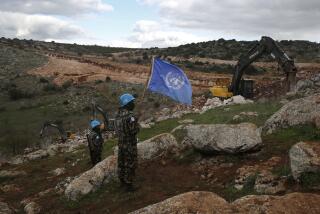Monitors’ Exit From Kosovo Brings Fears of Blood Bath
- Share via
CIREZ, Yugoslavia — International peace monitors began an exodus from Yugoslavia on Friday, raising Kosovo Albanian fears of a blood bath if NATO bombs start falling and Serbs seek revenge.
As the North Atlantic Treaty Organization’s threat of airstrikes loomed larger, the first of about 1,400 peace monitors, including several hundred Americans, began heading for the Macedonian border.
Although the unarmed monitors have been powerless to stop Kosovo’s war, they have been witnesses who could lay the blame for crucial events, such as the massacre of at least 45 Kosovo Albanians in the village of Racak on Jan. 15.
Without the monitors around, ethnic Albanians said, they are all the more scared that Serbs will retaliate against them if NATO delivers on its threat to strike military targets in Yugoslavia. Kosovo is a province of Serbia, the larger of Yugoslavia’s two republics, and is 90% ethnic Albanian.
Danger from the Serbs is not new to villagers like Shukri Ahmeti, 55, who said NATO should go ahead and attack to stop a Yugoslav army offensive that drove him from his village Friday.
“Maybe the Serbs will forget us if bombs are falling on them,” Ahmeti said as he brought eight women and three children out of the battle zone behind a farmer’s tractor. “Maybe they will start to run away. Who knows?
“It’s better to bomb because otherwise we cannot survive. They will not leave us alive.”
The Organization for Security and Cooperation in Europe, which set up the international monitoring mission, ordered the observers to begin leaving Friday, but the bulk of them are expected to depart today.
They will drive out in a long convoy that, even if it doesn’t run into trouble along the way, is expected to take at least eight hours to cross the border into Macedonia.
“The situation has made it increasingly difficult for the team to carry out their task, and it is no longer justifiable to keep them in Kosovo,” said Knut Vollebaek, who heads the OSCE.
More than 10,000 NATO troops are already training in Macedonia for peacekeeping duties in Kosovo in the event that Yugoslav President Slobodan Milosevic backs down and agrees to let them in as part of a peace deal with the separatists in the province.
A small NATO contingent was on standby Friday for an emergency evacuation of the international monitors in Kosovo, but Yugoslav leaders repeatedly have said they will treat any such rescuers as foreign invaders and attack them.
Also Friday, the U.S. Embassy and several other foreign missions in Belgrade, the Serbian and Yugoslav capital, announced that nonessential staff and their families will leave the country.
About 60,000 Kosovo Albanians have been forced to flee Serbian attacks since December, U.S. Gen. Wesley Clark, NATO’s top commander, said in Mons, Belgium, on Friday.
The Yugoslav military has deployed more than 40,000 troops in and around Kosovo and is preparing for “a vast and violent onslaught,” Clark added.
Ahmeti brought the women and children out of Krasmirovc village, in the shadow of the strategic Cicavica mountains, where Yugoslav troops are advancing deeper into guerrilla territory.
Peace monitors had warned villagers in the area that Serbian security forces were preparing to launch a pincers attack to hit Kosovo Liberation Army guerrillas, and the villages where they operate, from two sides, Ahmeti said.
Serbian shells and mortar bombs had been exploding near Krasmirovc and nearby villages for days, but everything suddenly fell quiet Thursday night, Ahmeti added.
That’s when the villagers felt most afraid, because the silence signaled that ground troops would try to seize the village very soon, Ahmeti said. At dawn, he set his few cows free, gathered his family and fled.
Just a few miles from the front line, about 2,000 refugees from six villages have moved into Cirez, one of two villages where Kosovo’s war began Feb. 28, 1998.
Cirez and neighboring Likoshane are now within range of the Yugoslav army’s heavy guns.
KLA fighters helped distribute blankets, used clothes and toiletries to the refugees Friday from relief supplies donated by the European Union and the United Nations.
Xhafer Halimi, 57, was in the lineup to get aid. He said he will head back with what he received to the village of Kozhica, even though that is on the firing line of the Serbian advance.
“I will always be at my home, even when there is a big offensive,” Halimi said. “We are not afraid to go back because we don’t have anywhere else to go.
“If something is going to happen to us, let it happen at our home.”
More to Read
Sign up for Essential California
The most important California stories and recommendations in your inbox every morning.
You may occasionally receive promotional content from the Los Angeles Times.













